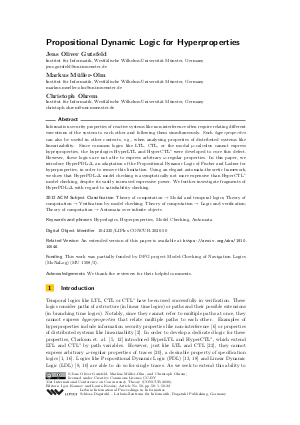@InProceedings{gutsfeld_et_al:LIPIcs.CONCUR.2020.50,
author = {Gutsfeld, Jens Oliver and M\"{u}ller-Olm, Markus and Ohrem, Christoph},
title = {{Propositional Dynamic Logic for Hyperproperties}},
booktitle = {31st International Conference on Concurrency Theory (CONCUR 2020)},
pages = {50:1--50:22},
series = {Leibniz International Proceedings in Informatics (LIPIcs)},
ISBN = {978-3-95977-160-3},
ISSN = {1868-8969},
year = {2020},
volume = {171},
editor = {Konnov, Igor and Kov\'{a}cs, Laura},
publisher = {Schloss Dagstuhl -- Leibniz-Zentrum f{\"u}r Informatik},
address = {Dagstuhl, Germany},
URL = {https://drops.dagstuhl.de/entities/document/10.4230/LIPIcs.CONCUR.2020.50},
URN = {urn:nbn:de:0030-drops-128628},
doi = {10.4230/LIPIcs.CONCUR.2020.50},
annote = {Keywords: Hyperlogics, Hyperproperties, Model Checking, Automata}
}

 Creative Commons Attribution 3.0 Unported license
Creative Commons Attribution 3.0 Unported license
